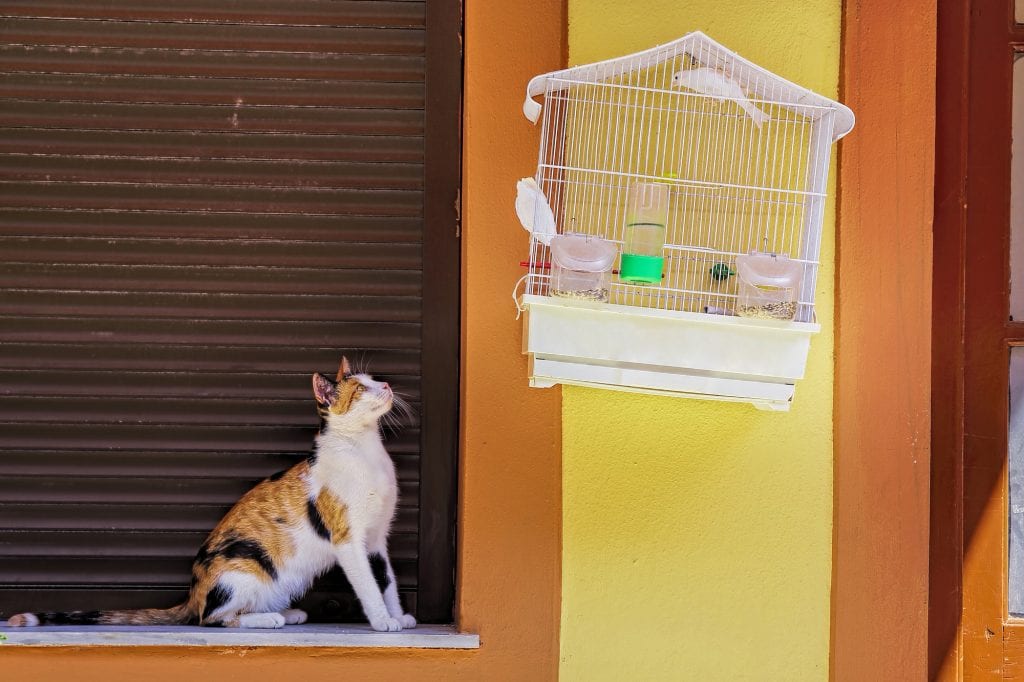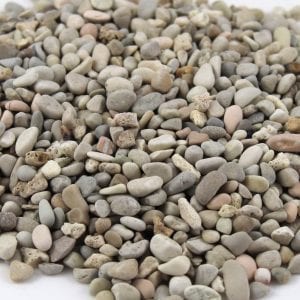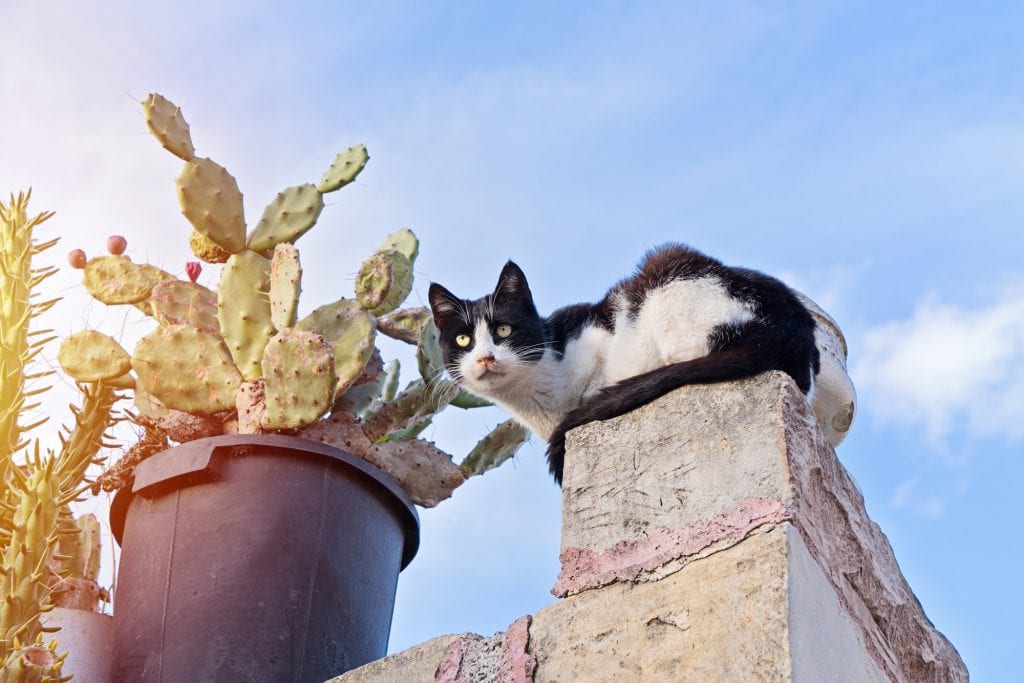
How to Keep Cats From Raising Havoc in Your Yard
This post may prompt a few angry emojis, but here goes nothing…
This is an anti-cat post.
I’m not bashing the cuddly cuteness, and I’m certainly not bashing cat videos, because they’re the best. But when it comes to gardening, cats can cause a lot of mayhem and downright annoyance.
Imagine plopping down on your outdoor daybed in front of a roaring fire pit, ready for a relaxing evening, when all of a sudden a strong urine smell hits your nostrils.
Or, you’re tired of chasing the feral cat who keeps attacking the songbirds in your backyard.
And in true cat fashion, it seems that the more you display your frustration, the more the neighborhood kitties take pleasure in pestering you. Just kidding! But you know cats…
Are cats really pests?

It’s not that they are aggravating, but cats actually pose risks to humans and the local ecosystem.
Outdoor cats tend to use flower beds as a litter box, which can be a health hazard. Their fecal matter consists of a multitude of parasites and pathogens, one of which is a hazard to humans called toxoplasmosis.
The chances of getting infected are slim, but pregnant women and immune-compromised individuals should take extra care.
Besides presenting health risks, cats destroy gardens by digging up plants, spraying on furniture, yowling, killing native species and backyard chicks, and eating certain veggies.
Having a hissy fit over a certain feline? Keep your claws in. These tips can help you naturally repel cats from lording over your backyard.
Layer sandy areas with landscaping pebbles

Cats love loose soil and sand. They’ll dig it up and turn it into a litter box. Luckily, there’s an easy solution to thwart their golden toilet dreams.
Cats hate spikey or rough materials, such as garden stones, jagged pebbles, or shells. You can easily find pebbles at your local garden products store and layer them over areas of your yard where you’ve found cat feces or holes.
Pro Tip: When disposing of cat feces, make sure to wear gloves and wash your hands afterward to avoid exposure to toxoplasmosis.
Install a cat-proofing fence
Yes cats, we are all impressed by your acrobatic skills. But not when you can get over any and all fences to attack those poor songbirds.
Instead, install a cat-proof fence. There are 2 easy options to choose from:

1. Chicken wire or bird netting
Cats hate the prickly feeling of this type of wired fence. Cover the ground on top of the soil in flower beds, leaving small pockets to plant your veggies and seeds.
2. Roll bars
These special bars or paddles can be installed on top of your fence. When a cat jumps on up, they will be met with a rolling surprise that sends them hurtling back down to the ground. Don’t worry- cats always land on their feet!
Check out this video, which teaches you how to make your own DIY roll bar fence topper:
Use the power of plants to repel cats
Cats have a strong sense of smell, and fortunately for garden enthusiasts, this can be used against them.
There are several herbs, oils, and plants that give off distinctive scents that cats hate. One, in particular, is called Coleus Canina, also known as the “scaredy cat” plant.
Be careful when purchasing this plant, as there are several varieties, and Coleus Canina is the most effective. Plant it 1-3 feet between your other plants.
Besides Coleus Canina, there are plenty of other cat repellent superstars, such as…
- Rue
- Lemon thyme
- Lavender
- Pipe tobacco
- Garlic
- Cayenne pepper
- Citrus peelings
- Coffee grounds
Essential oils go a long way, too
Essential oils are all-natural and just a few drops on your fence and patio furniture can repel cats. The following works best…
- Peppermint
- Mustard
- Citronella
- Lemongrass
- Geranium

Conclusion: You CAN beat cats at their own game
Cats like to mess with us humans when it comes to who rules the garden, but there are safe and natural ways to keep them away.
From scents to landscaping pebbles, you don’t have to invest a lot of money to get the job done.
If problems persist, especially with feral cats, you can always call a Trap-Neuter-Release (TNR) program to come by. This will stop the spraying and late-night howling.
Do you have any tricks to keep cats out of the yard? Tell us in the comments!
23 Comments
-
erotik
Hello, I log on to your new stuff on a regular basis. Your humoristic style is witty, keep up the good work!| Brigit Thedrick Mori
-
instagram takipçi satın al
This website certainly has all of the information I needed concerning this subject and didn’t know who to ask.
-
Ayak Resimleri
I am grateful to you for this beautiful content. I have included the content in my favorites list and will always wait for your new blog posts.
-
instagram takipçi satın al
I will right away clutch your rss as I can’t in finding
your e-mail subscription hyperlink or newsletter service.
Do you’ve any? Kindly let me recognize so that I could subscribe.
Thanks. -
instagram takipçi satın al
You are so interesting! I don’t believe I have read something like this before.
So good to discover another person with original thoughts on this issue.
Really.. many thanks for starting this up. This website is
one thing that is needed on the internet, someone with some originality! -
instagram takipçi satın al
Amazing! Its truly remarkable post, I have got much clear idea on the topic of
from this paragraph. -
Film Ä°zle
I am grateful to you for this beautiful content. I have included the content in my favorites list and will always wait for your new blog posts.
-
instagram takipçi satın al
Thanks for any other informative web site.
Where else may I am getting that type of information written in such a perfect manner?
I’ve a undertaking that I am just now working on, and I
have been on the look out for such information. -
instagram takipçi satın al
I don’t know if it’s just me or if everyone else encountering issues with your site.
It seems like some of the written text within your posts are running off the screen.
Can someone else please provide feedback and let me know if this is happening to them as well?This might be a problem with my browser because I’ve
had this happen previously. Thanks -
İnstagram Takipçi Satın Al
I am grateful to you for this beautiful content. I have included the content in my favorites list and will always wait for your new blog posts.
-
Ä°nstagram BeÄeni
I am grateful to you for this beautiful content. I have included the content in my favorites list and will always wait for your new blog posts.
-
Takipçi Satın Al
I am grateful to you for this beautiful content. I have included the content in my favorites list and will always wait for your new blog posts.
-
Instagram Takipçi Satın Al
I am grateful to you for this beautiful content. I have included the content in my favorites list and will always wait for your new blog posts.
-
instagram takipçi satın al
Hi there just wanted to give you a quick heads
up. The words in your article seem to be running off the screen in Safari.
I’m not sure if this is a formatting issue or something to do with internet browser compatibility but I thought I’d post to let you know.
The design and style look great though! Hope you get the issue solved soon. Thanks -
instagram takipçi satın al
Awesome things here. I’m very happy to look your post. Thank you
a lot and I’m taking a look ahead to touch you. Will you kindly
drop me a mail? -
instagram takipçi satın al
Very good article! We will be linking to this particularly great article on our website.
Keep up the good writing. -
instagram takipçi satın al
Hey there! I’m at work surfing around your blog from my new iphone!
Just wanted to say I love reading your blog and look
forward to all your posts! Keep up the superb work! -
cialis 100 mg orjinal satıŠsitesi
I follow this place weekly whenever I get the chance. Thank you for the regular update and information.
-
cialis 100 mg orjinal satıŠsitesi
Again, I found the best information here. I can immediately find the answers to all the questions I have in my mind on your website and this makes me very happy.
-
Pomeranian Boo
Hello, I like your site very much. I will come back more often now to read articles.
-
Log in
I have read your article carefully and I agree with you very much. This has provided a great help for my thesis writing, and I will seriously improve it. However, I don’t know much about a certain place. Can you help me?
-
pendik escort
I’m often to blogging and i really appreciate your content. The article has actually peaks my interest. I’m going to bookmark your web site and maintain checking for brand spanking new information.






Noah
This is a topic that’s near to my heart… Thank
you! Exactly where are your contact details though?